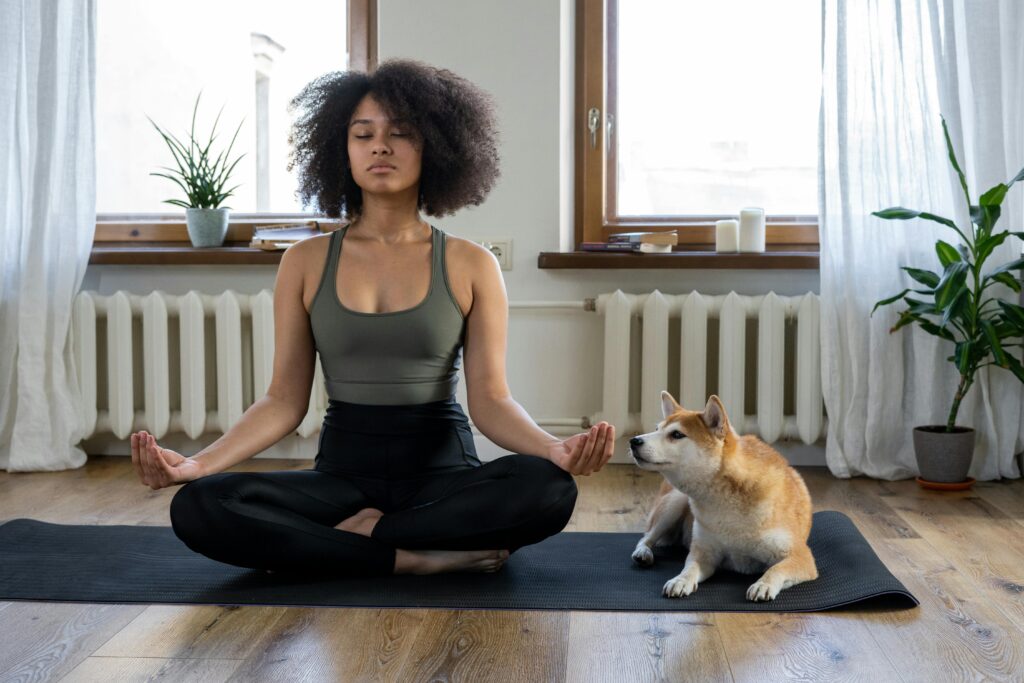
Hey there! If you’re reading this, chances are you know exactly what stress feels like. Trust me, I totally get it – in our lives, packed with events and worries, it can be really tough to stay calm. But the good news is, there are tons of natural ways to relieve stress and get back to feeling like yourself again. In this article, I’m going to share some proven techniques to lower stress effectively and without any weird stuff, right in the comfort of your own home. Together, we’ll find easy stress reduction methods that will help you handle everyday challenges better and get your stress management at home on track.

Table of Contents:
- Introduction
- Step-by-Step Guide: Your Personal Anti-Stress Plan
- Proven Natural Methods for Reducing Stress
- Checklist: My Steps to Calm
- My Personal Tips for You
- In Conclusion
- Meta description: Discover how to naturally deal with stress and improve your well-being with proven techniques. My easy stress reduction methods and natural ways to relieve stress can help you starting today!
- Keywords: how to deal with stress naturally, natural ways to relieve stress, proven techniques, easy stress reduction methods, stress management at home, quick ways to calm anxiety, mind-body practices, healthy habits against stress, effective stress coping strategies, natural remedies for stress and anxiety
What is Stress and How Can it Really Wear Us Down?
Let’s be real: stress is that thing that can hit us out of nowhere and totally throw us off balance.  Our bodies react to all sorts of “triggers” that we perceive as a threat. This can show up physically – your heart starts racing, your blood pressure goes up, you get a headache – and emotionally: we become irritable, anxious, and sometimes just plain down.
Our bodies react to all sorts of “triggers” that we perceive as a threat. This can show up physically – your heart starts racing, your blood pressure goes up, you get a headache – and emotionally: we become irritable, anxious, and sometimes just plain down.

And you know what’s the worst part? If this stress becomes chronic, it can seriously mess with our health. We’re talking heart problems, digestive issues, sleep goes out the window, and your mood just tanks.  That’s why it’s so important to find your own natural ways to relieve stress and weave effective stress coping strategies into your life to keep your mind and body in check.
That’s why it’s so important to find your own natural ways to relieve stress and weave effective stress coping strategies into your life to keep your mind and body in check.
Step-by-Step Guide: Your Personal Anti-Stress Plan
My Simple and Effective Plan for a More Peaceful Life

You know, I’ve been there too, and here’s what I’ve found really works when you need to deal with stress at home:
- Identify Your Triggers: Take a moment to think about what specifically makes you feel stressed.
 Try keeping a journal for a few days to jot down when and why you feel that tension building up. Trust me, understanding your “triggers” is half the battle in stress management at home.
Try keeping a journal for a few days to jot down when and why you feel that tension building up. Trust me, understanding your “triggers” is half the battle in stress management at home. - Movement is Life (and Anti-Stress!): Aim to get at least 30 minutes of moderate-intensity exercise most days of the week. This is one of the best natural remedies for stress and anxiety. Whether it’s a brisk walk, a yoga session, or dancing to your favorite tunes – find an activity you enjoy!
- Sleep is Our Best Friend: Try to establish a regular sleep schedule and create a cozy atmosphere in your bedroom. Aim for 7-8 hours of quality sleep each night. Good sleep is the foundation of our ability to handle stress.
- Find Your Relaxation Technique: Experiment with different mind-body practices for stress relief. Some people find meditation helpful
 , others prefer deep breathing exercises
, others prefer deep breathing exercises  , yoga
, yoga  , massage
, massage  , listening to calming music
, listening to calming music  , or simply reading a good book
, or simply reading a good book  in nature
in nature  . Find what resonates with you and dedicate at least 5-10 minutes to it each day. It really helps to quickly calm anxiety naturally.
. Find what resonates with you and dedicate at least 5-10 minutes to it each day. It really helps to quickly calm anxiety naturally. - Nourish Your Body: What we eat directly impacts how we feel. Try to eat a balanced diet, including more fruits, vegetables, and whole grains. Limit processed foods, sugary drinks, and caffeine – they can make stress symptoms worse.
- Connect with Loved Ones: Spend time with people who support and understand you. Talking things out with a friend or family member can really ease tension.
- Set Realistic Goals and Learn to Say “No”: Don’t try to do everything at once. If you feel overwhelmed, don’t be afraid to decline extra responsibilities. Knowing your limits and setting boundaries is key to preventing unnecessary stress.
- Take Breaks and Make Time for Hobbies: Throughout the day, make sure to take short breaks to do something you enjoy. Hobbies are a fantastic way to unwind and have fun.
- Practice Gratitude: Take some time each day to think about the things you’re grateful for. This simple practice can shift your focus from stressors to the positive aspects of your life.
- Don’t Hesitate to Seek Help: If you feel like you can’t manage stress on your own, don’t hesitate to reach out to a therapist or counselor. Professional support can provide you with additional effective stress coping strategies.

Proven Natural Methods for Reducing Stress
Let’s Take a Closer Look at Natural Ways to Relieve Stress
Beyond the step-by-step guide, I want to share some more effective methods with you:
Physical Activity as a Natural Remedy for Stress

Regular exercise is a cornerstone of natural stress relief. It releases endorphins, which have mood-boosting and pain-relieving effects. Find an activity you love, whether it’s walking, running, swimming, dancing, or cycling. Consistency is key to reaping the long-term benefits for stress management.
Healthy Diet: The Foundation of Our Calm
Your diet plays a significant role in your stress response. A balanced diet rich in nutrients can help your body better cope with stress. Focus on whole foods and try to limit processed foods, sugary drinks, and excessive caffeine and alcohol.

Prioritizing Quality Sleep for Stress Management
When we get enough good-quality sleep, our bodies and minds can recover and better handle stress. Lack of sleep, on the other hand, makes us more vulnerable. Aim for 7-8 hours of sleep each night and create a relaxing bedtime routine.
Prioritizing Quality Sleep for Stress Management

These techniques focus on the connection between your mind and body to promote relaxation and reduce stress:
- Meditation: Regular meditation can help you become more aware of your thoughts and feelings without judgment, reducing rumination and anxiety.
- Deep Breathing Exercises: Simple breathing techniques can quickly calm your nervous system in stressful moments. Practice slow, deep inhales and exhales.
- Yoga: Combines physical postures, breathing techniques, and meditation to promote relaxation and reduce stress hormones.
- Mindfulness: Paying attention to the present moment without judgment can help interrupt the cycle of stressful thoughts.
The Importance of Social Connection
Spending time with loved ones provides emotional support and helps combat feelings of isolation, which can contribute to stress. Don’t keep everything bottled up – share your feelings with trusted friends or family.

The Healing Power of Nature
Studies have shown that spending time outdoors can lower stress hormones and improve mood. Even a short walk in a park can make a difference.
Checklist: My Steps to Calm
- I engage in regular physical activity.

- I try to eat a balanced diet.

- I get enough sleep.

- I practice relaxation techniques (meditation, deep breathing, yoga, mindfulness).

- I maintain connections with supportive people.

- I make time for walks in nature.

- I set realistic goals and don’t overcommit myself.

- I regularly take breaks and engage in hobbies.

- I try to be grateful for what I have.

- I’m not afraid to seek help if I need it.


My Personal Tips for You
- Start small and gradually incorporate these healthy habits against stress into your routine. Don’t try to change everything at once.
- Experiment with different mind-body practices for stress relief and find the ones that you truly enjoy and that bring you relief.
- Be patient with yourself. Building new habits and seeing significant changes in your stress levels takes time.
- Remember that asking for help is a sign of strength. If you’re struggling, don’t hesitate to reach out to a healthcare professional or therapist for guidance on effective stress coping strategies.
- Incorporate quick ways to calm anxiety naturally into your daily life, such as taking a few deep breaths when you feel overwhelmed.

In Conclusion
Learning how to deal with stress naturally is an investment in your long-term health and well-being. By incorporating these proven techniques to lower stress and adopting healthy habits against stress, you can significantly improve your ability to manage life’s challenges and cultivate a greater sense of calm and resilience. Remember to be kind to yourself and celebrate your progress as you embark on this journey towards a less stressful life.

P.S. Remember that this article is for informational purposes only and does not substitute professional medical advice. If you have serious health concerns or experience persistent high levels of stress and anxiety, please consult a healthcare professional for personalized guidance and treatment.
